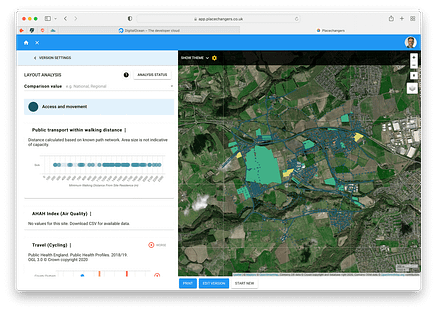Context
The Roseberry project from Karbon Homes was no easy feat - designed on a long-vacant former school site in an area that was waiting for regeneration. With the increased focus on project impacts of larger housing projects, for the project team it also meant addressing new requirements in Durham Council's revised local plan in relation to health impacts. As of late, any development with more than 100 homes requires a dedicated health impact assessment to fulfill planning application validation requirements.
While Sunderland City Council has required health impact assessments for significant developments for some time, this is a relatively recent requirement for the North East region. Now, Northumberland County Council and Durham County Council have expanded their requirements to include health impact assessments for all major developments.
For Hedley Planning, the firm responsible for preparing the Roseberry project's planning application, the health impact assessment presented an exciting challenge to innovate. It was the first health impact assessment Hedley Planning had prepared. But with the team's expertise and access to structured health assessment guidance and health-focused analytics on PlaceChangers, they were more than up to the task.
What was done
To quickly complete a Health Impact Assessment for the Roseberry project, Hedley Planning utilized the PlaceChangers planning toolkit, which features a structured appraisal tool and a place report. By analyzing various geospatial and statistical data sources on Pelton, the PlaceChangers platform generated a comprehensive baseline report with a focus on health impacts.
Place analytics included the following evidence:
- 1Health and relevant socio-demographic data from ONS and Public Health England - benchmarked against national levels to demonstrate health inequalities.
- 2Indicators for access to open spaces, health care, healthy foods environments, and air quality from Ordnance Survey and Open Street Map
- 3Suggestions for health impacts/interventions based on benchmarks based on various quantitative studies.
- 4Walking-distance-based coverage analysis and ability to generate and attach maps of relevant features against specific criteria

PlaceChangers planning toolkit provides ready access to relevant health indicators and additional geospatial analysis of social infrastructure provision
Hedley Planning utilized the PlaceChangers planning toolkit, including its beta appraisal tool, to conduct a swift health impact assessment for the Roseberry project. The appraisal tool was based on the HUDU rapid health impact assessment framework and offered a structured approach to evaluate health impacts across different themes. The interactive tool allowed for easy referencing of pertinent evidence from the place report and integration with the consultant's observations.
The PlaceChangers team provided further support to validate the data in the place report. This enabled easy cross-referencing of particular locations or proposal aspects that were relevant to specific criteria. The resulting report was shareable with the client and other team members for review.
Outcomes
With the aid of the PlaceChangers place report and an interactive appraisal template, Hedley Planning was able to complete the health impact assessment in half the usual time required. The PlaceChangers assessment metrics were included in the final report, which was attached to the HIA cover report submitted to the council officers.
This efficient and evidence-based approach not only enabled the successful submission of the planning application but also positions Hedley Planning to competitively and competently bid for similar work in the future. Thanks to the PlaceChangers appraisal tool, the team has gained valuable experience and confidence in completing health impact assessments.
This project was granted full planning permission in late 2022.
Alex Franklin
Hedley Planning
"The combination of the criteria, place evidence and ability to link locations assisted in the preparation of a well-evidenced Health Impact Assessment quickly. The provision of a ready-made structure on the platform ensured a swift preparation of required validation documents."
